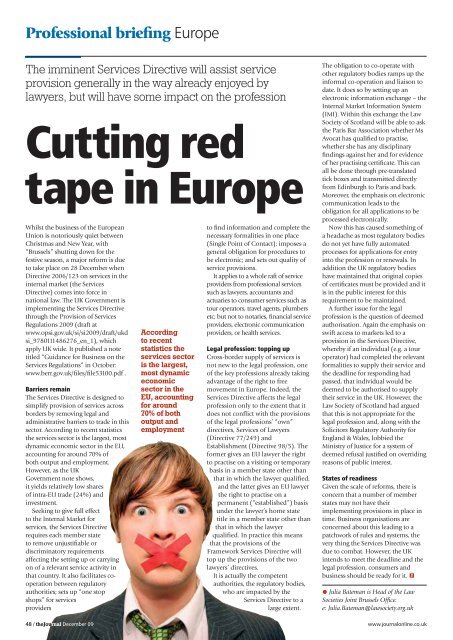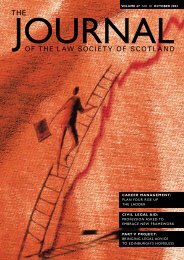Professional briefing - The Journal Online
Professional briefing - The Journal Online
Professional briefing - The Journal Online
Create successful ePaper yourself
Turn your PDF publications into a flip-book with our unique Google optimized e-Paper software.
<strong>Professional</strong> <strong>briefing</strong> Europe<br />
<strong>The</strong> imminent Services Directive will assist service<br />
provision generally in the way already enjoyed by<br />
lawyers, but will have some impact on the profession<br />
Cutting red<br />
tape in Europe<br />
Whilst the business of the European<br />
Union is notoriously quiet between<br />
Christmas and New Year, with<br />
“Brussels” shutting down for the<br />
festive season, a major reform is due<br />
to take place on 28 December when<br />
Directive 2006/123 on services in the<br />
internal market (the Services<br />
Directive) comes into force in<br />
national law. <strong>The</strong> UK Government is<br />
implementing the Services Directive<br />
through the Provision of Services<br />
Regulations 2009 (draft at<br />
www.opsi.gov.uk/si/si2009/draft/ukd<br />
si_9780111486276_en_1), which<br />
apply UK wide. It published a note<br />
titled “Guidance for Business on the<br />
Services Regulations” in October:<br />
www.berr.gov.uk/files/file53100.pdf .<br />
Barriers remain<br />
<strong>The</strong> Services Directive is designed to<br />
simplify provision of services across<br />
borders by removing legal and<br />
administrative barriers to trade in this<br />
sector. According to recent statistics<br />
the services sector is the largest, most<br />
dynamic economic sector in the EU,<br />
accounting for around 70% of<br />
both output and employment.<br />
However, as the UK<br />
Government note shows,<br />
it yields relatively low shares<br />
of intra-EU trade (24%) and<br />
investment.<br />
Seeking to give full effect<br />
to the Internal Market for<br />
services, the Services Directive<br />
requires each member state<br />
to remove unjustifiable or<br />
discriminatory requirements<br />
affecting the setting up or carrying<br />
on of a relevant service activity in<br />
that country. It also facilitates cooperation<br />
between regulatory<br />
authorities; sets up “one stop<br />
shops” for services<br />
providers<br />
48 / the<strong>Journal</strong> December 09<br />
According<br />
to recent<br />
statistics the<br />
services sector<br />
is the largest,<br />
most dynamic<br />
economic<br />
sector in the<br />
EU, accounting<br />
for around<br />
70% of both<br />
output and<br />
employment<br />
to find information and complete the<br />
necessary formalities in one place<br />
(Single Point of Contact); imposes a<br />
general obligation for procedures to<br />
be electronic; and sets out quality of<br />
service provisions.<br />
It applies to a whole raft of service<br />
providers from professional services<br />
such as lawyers, accountants and<br />
actuaries to consumer services such as<br />
tour operators, travel agents, plumbers<br />
etc; but not to notaries, financial service<br />
providers, electronic communication<br />
providers, or health services.<br />
Legal profession: topping up<br />
Cross-border supply of services is<br />
not new to the legal profession, one<br />
of the key professions already taking<br />
advantage of the right to free<br />
movement in Europe. Indeed, the<br />
Services Directive affects the legal<br />
profession only to the extent that it<br />
does not conflict with the provisions<br />
of the legal professions’ “own”<br />
directives, Services of Lawyers<br />
(Directive 77/249) and<br />
Establishment (Directive 98/5). <strong>The</strong><br />
former gives an EU lawyer the right<br />
to practise on a visiting or temporary<br />
basis in a member state other than<br />
that in which the lawyer qualified,<br />
and the latter gives an EU lawyer<br />
the right to practise on a<br />
permanent (“established”) basis<br />
under the lawyer’s home state<br />
title in a member state other than<br />
that in which the lawyer<br />
qualified. In practice this means<br />
that the provisions of the<br />
Framework Services Directive will<br />
top up the provisions of the two<br />
lawyers’ directives.<br />
It is actually the competent<br />
authorities, the regulatory bodies,<br />
who are impacted by the<br />
Services Directive to a<br />
large extent.<br />
<strong>The</strong> obligation to co-operate with<br />
other regulatory bodies ramps up the<br />
informal co-operation and liaison to<br />
date. It does so by setting up an<br />
electronic information exchange – the<br />
Internal Market Information System<br />
(IMI). Within this exchange the Law<br />
Society of Scotland will be able to ask<br />
the Paris Bar Association whether Ms<br />
Avocat has qualified to practise,<br />
whether she has any disciplinary<br />
findings against her and for evidence<br />
of her practising certificate. This can<br />
all be done through pre-translated<br />
tick boxes and transmitted directly<br />
from Edinburgh to Paris and back.<br />
Moreover, the emphasis on electronic<br />
communication leads to the<br />
obligation for all applications to be<br />
processed electronically.<br />
Now this has caused something of<br />
a headache as most regulatory bodies<br />
do not yet have fully automated<br />
processes for applications for entry<br />
into the profession or renewals. In<br />
addition the UK regulatory bodies<br />
have maintained that original copies<br />
of certificates must be provided and it<br />
is in the public interest for this<br />
requirement to be maintained.<br />
A further issue for the legal<br />
profession is the question of deemed<br />
authorisation. Again the emphasis on<br />
swift access to markets led to a<br />
provision in the Services Directive,<br />
whereby if an individual (e.g. a tour<br />
operator) had completed the relevant<br />
formalities to supply their service and<br />
the deadline for responding had<br />
passed, that individual would be<br />
deemed to be authorised to supply<br />
their service in the UK. However, the<br />
Law Society of Scotland had argued<br />
that this is not appropriate for the<br />
legal profession and, along with the<br />
Solicitors Regulatory Authority for<br />
England & Wales, lobbied the<br />
Ministry of Justice for a system of<br />
deemed refusal justified on overriding<br />
reasons of public interest.<br />
States of readiness<br />
Given the scale of reforms, there is<br />
concern that a number of member<br />
states may not have their<br />
implementing provisions in place in<br />
time. Business organisations are<br />
concerned about this leading to a<br />
patchwork of rules and systems, the<br />
very thing the Services Directive was<br />
due to combat. However, the UK<br />
intends to meet the deadline and the<br />
legal profession, consumers and<br />
business should be ready for it.<br />
Julia Bateman is Head of the Law<br />
Societies Joint Brussels Office.<br />
e: Julia.Bateman@lawsociety.org.uk<br />
www.journalonline.co.uk










